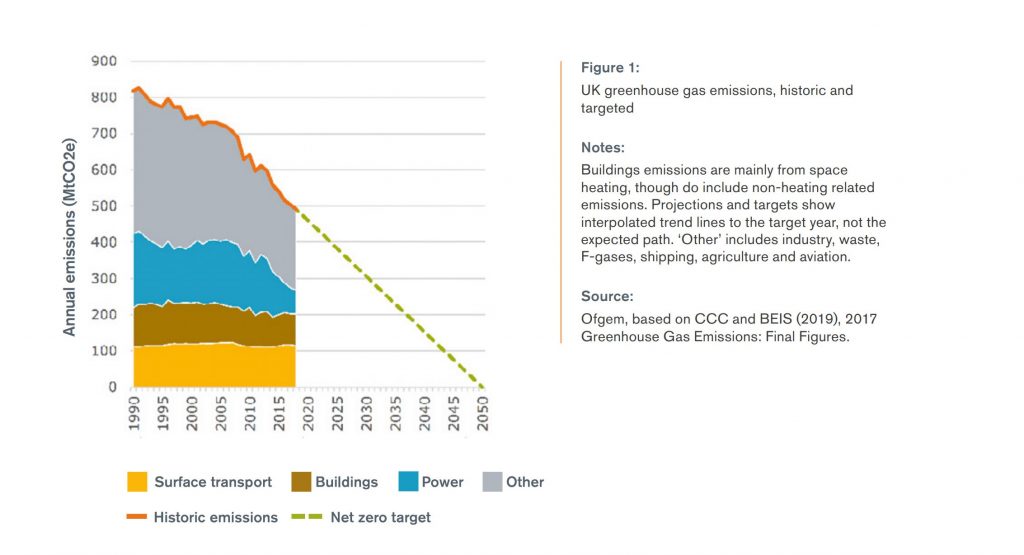The UK has made significant progress in decarbonising the economy – overall emissions have fallen by 40% since 1990 and almost half our electricity came from renewable or low carbon sources in 2019. However, to achieve net-zero by 2050, the energy landscape needs to continue to evolve through new technologies and flexible ways of balancing supply and demand.
Following criticism for failing to prioritise the climate emergency, Britain’s energy regulator, Ofgem, released a report detailing how it will govern the industry to help meet the government’s climate targets. The nine-point plan focuses on:
- Adaptable price controls to help firms invest in clean energy.
- Funds to help invest in climate-change solutions.
- Ways to create a “lowest cost” offshore grid to support wind power.
- Decarbonation of heat by working with industry and government
- Ensuring UK energy systems fit for a net-zero future.
- More flexible electricity systems to help move towards net zero.
- A regulatory strategy to help get 10m electric cars on the road by 2030.
- Supporting energy firms to create low-carbon products and services for consumers.
- Changing internal regulations and take “big decisions” on decarbonisation faster.

Evidentially, Ofgem has a pivotal role in paving the way for the energy sector. However, we all have a part to play in achieving the net-zero target: government, industry and individual consumers. Greater reliance on weather-dependent, renewable sources poses its own set of challenges, so what if we looked at electricity usage, rather than how it’s generated? At SPECIFIC, we’re working with over 250 volunteers to test how flexibility in when energy is consumed could benefit the grid, and potentially reduce bills for consumers.
The project is in collaboration with Evergreen Smart Power, Tonik Energy, myenergi, and the Energy Systems Catapult to explore the benefits of ‘demand side response’ (DSR) in homes. Domestic DSR aims to work with consumers to use electricity more intelligently throughout the day, and ultimately, reduce grid stress in times of high demand. For example, between 4pm and 7pm electricity demand is at its highest, so energy can be diverted away from energy-intensive processes (like charging electric vehicles) to later in the evening when energy is cheaper and more environmentally-friendly to supply. Alternatively, if the weather is going to be sunny, then appliances and car charging can be activated when there is an abundance of ‘free’ solar energy.
This approach has many benefits, namely, reducing bills, balancing the national grid, and reducing the carbon footprint of the electricity consumed. DSR is already well established within industry, but the opportunities for DSR in the home, driven by consumers, is yet to be fully explored. Ofgem asserts that meeting net zero “…will require consumers to be engaged…[because] how and when energy is used must change. This opens up opportunities for a consumer-led transition, enabled by new technologies” –our collaborative project will provide some key insights and facilitate that all-important transition.
>> Find out more about the project here <<
>> Read Ofgem’s report here <<
